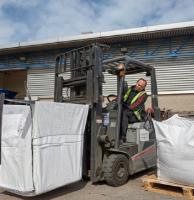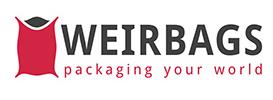 Add My Company
Add My Company
Sign In

Buying Guide and Terminology Info for Bulk Bags
Bulk bags are commonly referred to as Builders bags, Tonne bags, FIBC’s, Dumpy bags. They come in a range of sizes and specifications and each type will suit different applications. This can sometimes make it difficult to determine what type will be needed for the product being packed.Usually the specification for these products will be technical and hard to understand. Find a rundown below of terms for bulk bags and their meaning. This will enable you to make informed decisions about the bulk bag you require.
Bulk bags are commonly referred to as Builders bags, Tonne bags, FIBC’s, Dumpy bags. Bulk bags come in a range of sizes and specifications and each type will suit different applications. This can sometimes make it difficult to determine what type will be needed for the product being packed.
When selecting an FIBC for use, consideration should be given to the methods that you will be using for filling, handling, transporting, storing and emptying the bulk bag and the physical properties or chemical properties of the intended contents of the bulk bag, such as:
Weight of product to be contained
Required volume
Bulk density
Flow characteristics
Degree of aeration
Particle size and shape
Fill temperature
Is food grade required?
Usually the specification for these products will be technical and hard to understand. Find a rundown below of terms for bulk bags and their meaning. This will enable you to make informed decisions about the bulk bag you require.
Terminology Information
Available class of IBC = Single trip, standard duty reusable or heavy duty reusable.
Size = usually shown in external dimensions and in centimetres.
SWL (Safe working load) = this is the given capacity of the bag and relates to the maximum weight or volume of product that the bulk bag can hold. It will usually be shown in kilograms and ranges from 250kg – 2000kg
Safety factor: Standard bulk bags will have a safety factor of 5:1, which means that, when tested in laboratory conditions, a 1000kg capacity bag is guaranteed not to break, rip or tear with a weight of less than 5000kg. A safety factor of 6:1, is usually a heavy duty or multi trip FIBC, made out of thicker woven polypropylene body fabric and tested to a higher standard.
Filling and Discharging Features
Plain base – A Standard flat base on the bottom of the bulk bag. Standard builders bags will come with a plain base.
Lifting loops – All FIBCs will come with 4 lifting loops. These are strong loops sewn into each corner of the bag and allow the bag to be picked up and manoeuvred by a fork lift truck.
Filling inlet – This will either be a filling spout – (A long tube which allows the contents to flow into the bag easily) or a skirt top, (which is secured around the filling device to prevent any loss of contents, ensuring that all the contents flow easily into the bag.)
Discharge spout = A tube made out of bulk bag fabric which is sewn onto the bottom of the bulk bag. When held over a hopper and the contents discharged, it provides an easier flow of the contents out the bag.
Baffles = Additional internal baffles are sewn within the corners of the bulk bag which help to stabilise the bag and make it more rigid. These are specifically used for unstable or fluid products.
Food grade = Usually comes with an internal polythene lamination. Food grade manufacturing relates to the conditions in which the bulk bag has been manufactured and stored in before delivery to customer. These conditions are based on strict standards which allow the bag to be suitable for use for foodstuffs. There are two main types of food grade conditions;
Clean room is where the manufacturing/storage facilities are free of loose threads, dirt and dust to prevent risk of contamination. This manufacturing processs is usually more suited to bird seed and animal feed.
BRC compliant food grade bulk bags have been manufactured and stored in stringent conditions that meet the BRC standards. This ensures the food grade fibc is suitable to package food ingredients without the risk of being contaminated.
Liners - An internal polythene liner which provides added protection for the contents inside. Liner can either be:
Inserted loosely or tabbed
Cuffed, where the liner is inserted and the top section roll over the top of the bag to make it more secure.
Tabbed, liner is stitched in place at the corners to ensure stability inside the bag.
Weir & Carmichael supply all these types of bulk bags. We have been around for over 55 years so have gained a wealth of knowledge and experience in selling FIBCs to various industries. We will not be beaten on price, quality and service and would love the opportunity to help with any bulk bag enquiry.
Contact us today to see if we can help with your bulk bag requirement. 0151 934 1250
Or BUY BULK BAGS ONLINE
For more information on Buying Guide and Terminology Info for Bulk Bags talk to Weirbags Ltd
Enquire Now
List your company on FindTheNeedle.
